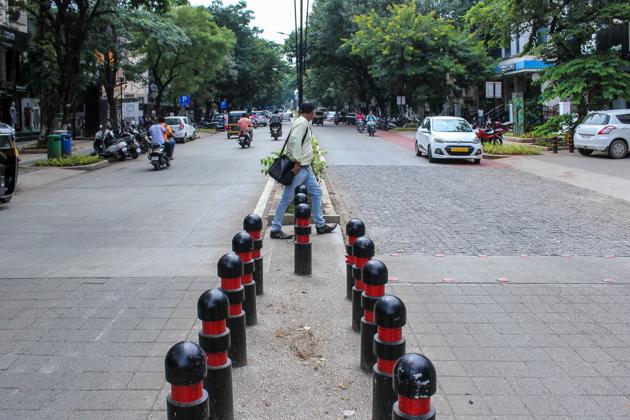Most stakeholders of Pune’s Aundh Smart City Mission have no idea about project
A street survey, conducted by Tata Institute of Social Sciences (TISS) students in Aundh between October 7 and October 16, revealed several other things about the project.
Aundh residents want the green cover and street vending markets in the area to be retained, said a street survey conducted by Tata Institute of Social Sciences (TISS) students in Aundh between October 7 and October 16. The residents also demanded more engagement of citizens in public decision making.

With Pune gearing towards becoming a smart city, the areas of Aundh-Baner and parts of Balewadi are initially being developed as model areas under the Smart City Mission. Government is spending more than ₹1,000 crore for better infrastructure and facilities in these areas. Various streets in the Aundh area are being developed with emphasis on equitable distribution of road space ensuring walkability, universal accessibility and being bicycle friendly.
Recently, TISS School of Habitat Studies and Centre for Environment Education (CEE) concluded a winter school on urban streets, mobility and governance. As part of this exercise, 20 students studied the Aundh area, exploring views of different local citizens, informal workers, elected representatives and other stakeholders on the nature of streets, street usage and governance.
They visited and surveyed nine streets in Aundh and tried to understand how residents of the area are reacting to the development of these streets under the Smart City Mission.
According to the findings presented by the students, among the top issues that residents felt should be addressed included need for service space for street vending, improvement in public transport, retaining green cover and social and cultural spaces in Aundh. Very importantly, a key area identified for improvement was the creation of public consultation forums and engagement of citizens in public decision making.
During the survey, it was observed that several stake holders like vendors and slum dwellers were left out while developing the streets. Also, there seemed to be no mechanism in place for continuous and systematic consultation and feedback. Students also emphasised that there was no awareness about the accountability and redressal mechanisms which had led to lack of trust between the governing agencies and the vulnerable stakeholders.
Prachi Mahajan, a visually challenged student who was part of the students group which surveyed the road stretch from Parihar chowk to Bremen chowk, said that even as the footpath is continuous from Parihar chowk to Bremen chowk, the walking track gets disconnected whenever there is an entrance to a society or shop which can cause inconvenience to differently-abled persons.
Speaking about the survey, Sanskriti Menon, programme director, Centre for Environment Education (CEE) said, "The student survey has brought to fore some interesting findings. People of the Aundh area have stated that they want tar roads with model footpaths.”
Menon said that the other issues which were highlighted from the survey included need for quality public transport, lack of public consultation forums and awareness about public projects. She added that residents wanted non-motorised modes to be the prioritised along with promoting shared and alternate modes of transport. Menon stressed that continuous public participation would help in addressing all citizens issues.
Major findings of the survey
1)Several stakeholder groups left out (eg. vendors, slum dwellers).
2)No mechanisms for continuous, systematic consultation and feedback.
3)Inadequate coordination between various stakeholders
4)Informal power structures affects the process of participation.
5)Most stakeholders interviewed had only a vague idea about the project.
6) Lack of awareness about the accountability and redressal mechanisms.
7) Lack of trust between the governing agencies and vulnerable stakeholders.
8) People redirect all responsibility to the Pune Smart City Development Corporation Limited (PSCDCL).
9) The project is still largely considered to be politically motivated.
Suggestions by TISS students
1) An effective and accessible information dissemination strategy.
2) Robust, systematic and continuous participation processes.
3) Increase accountability of governance agencies through education of citizens and government bodies.
4) Facilitating citizen forums for inter stakeholder discussions feeding back into governance
processes.
Public meeting, workshops for people’s views
As part of the survey, on October 14, Winter School and CEE conducted a public meeting, attended by about 40 people, including street vendors, shopkeepers, residents’ association representatives, office goers and youth. They deliberated on "How do we, the people representing all those who live and work on or nearby our streets and travel through them, want our streets to be used, designed, developed and maintained to best meet our needs as a community". This public deliberation workshop was organised for Aundh area. Similar workshops are proposed to be arranged in Baner and Balewadi. The expected outcome of these workshops is a citizens' manifesto for the streets and transportation services, for discussion with the concerned authorities and to track improvements.





